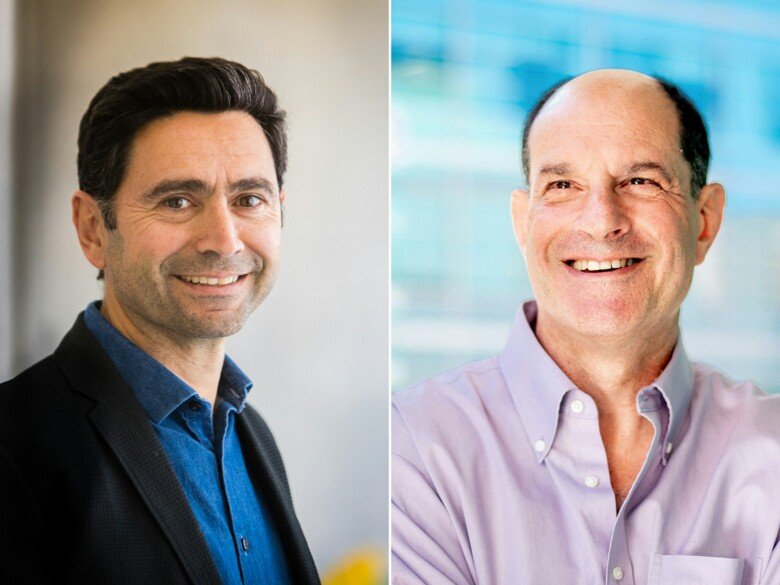
The Nobel Prize in Physiology or Medicine
In the first week of October each year, the recipients of the Nobel Prizes in Physiology or Medicine, Physics, Chemistry, Literature and Peace are announced, as Alfred Nobel stated in his will. First out is the Nobel Prize in Physiology or Medicine — and it is the Nobel Assembly at Karolinska Institutet that selects the recipients since 1901.
 Photo: Cecilia Odlind
Photo: Cecilia OdlindThe Nobel Prize in Physiology or Medicine 2024 to Victor Ambros and Gary Ruvkun
The Nobel Assembly at Karolinska Institutet has decided to award the 2024 Nobel Prize in Physiology or Medicine jointly to Victor Ambros and Gary Ruvkun for the discovery of microRNA and its role in post-transcriptional gene regulation.
 Photo: Erik Flyg
Photo: Erik FlygA prize that attracts worldwide attention
Few prizes attract the same attention worldwide and have such a rigorous selection process as the Nobel Prize. Thomas Perlmann is the one who makes that life-changing phone call the first Monday of every October.
 Photo: N/A
Photo: N/ATake part of Nobel Calling 2024 at Karolinska Institutet
Every year in October, the Nobel Prize laureates are announced. During the very same week, the Nobel Prize Museum organizes inspirational events and instructive meetings in collaboration with, among others, Karolinska Institutet.
Previous years' Nobel Prizes
 Photo: Ulf Sirborn.
Photo: Ulf Sirborn.Karikó and Weissman helped save millions of lives
The 2023 prize honoured a crucial research achievement during the COVID-19 pandemic. Katalin Karikó's and Drew Weissman's findings underpin the possibility of using a so-called mRNA platform to develop vaccines and drugs for a range of diseases.
Vaccines using messenger RNA, or mRNA, mean that the vaccine is finalised inside the body after a viral protein ‘map’ is inserted into the body's cells.
This research breakthrough was crucial to developing effective vaccines against COVID-19 and saving millions of lives.
 Photo: Pontus Lundhal/TT,TT NYHETSBYRÅN
Photo: Pontus Lundhal/TT,TT NYHETSBYRÅNSvante Pääbo brought out the Neanderthal in us
In 2022, research on the importance of Neanderthals to modern humans was rewarded. Or rather, how we carry their genes, which have been shown to be associated with both sensitivity to pain and the risk of developing severe covid-19, to name a few examples.
Svante Pääbo's Nobel Prize-winning research has also presented Denisovans, a previously unknown human species that has also contributed to the DNA of living humans.
 Photo: AFP/TT
Photo: AFP/TTArdem Patapoutian and David Julius unlocked one of nature’s secrets
The 2021 prize is about how people can feel temperature and touch. The discoveries explain basic functions in our lives and have opened doors to new treatments for pain, for example. We take for granted the fact that we can feel an icy wind or a hot plate, but how this actually works was discovered by the Nobel Laureates.
 Photo: NIH/Chiachi Chang; Michael Holly; och The Rockefeller University
Photo: NIH/Chiachi Chang; Michael Holly; och The Rockefeller UniversityHarvey J. Alter, Michael Houghton and Charles M. Rice discovered the hepatitis C virus
The 2020 prize awarded the discovery of the hepatitis C virus. Thanks to the work of the laureates, it is now possible to detect the virus in blood and to provide an effective treatment for the infection. It has saved the lives of millions of people. The prize also focuses on the importance of research into viruses.
KI researchers on the Nobel Prize in Chemistry
 Photo: Ulf Sirborn,Linnea Bengtsson
Photo: Ulf Sirborn,Linnea BengtssonProtein structures with AI 2024: “A good complement to experimental methods”
The 2024 Nobel Prize in Chemistry was awarded to David Baker, Demis Hassabis and John M. Jumper. David Baker is recognised for his work in creating entirely new proteins that can act as drugs, vaccines and nanomaterials. Demis Hassabis and John M. Jumper are behind the AI tool AlphaFold2, which can quickly predict the structure of proteins. Several KI researchers are using the technology, including for the development of new drugs.
 Photo: Andrew Brodhead/Stanford University,Philip Davali/Ritzau Scanpix/AFP,Bengt Oberger
Photo: Andrew Brodhead/Stanford University,Philip Davali/Ritzau Scanpix/AFP,Bengt ObergerClick chemistry 2022: “A fantastic tool for biological discoveries”
The Royal Swedish Academy of Sciences awarded the 2022 Nobel Prize in Chemistry to K. Barry Sharpless, Morten Meldal and Carolyn R. Bertozzi for the development of click chemistry, a quick and efficient way to build molecules. Several KI researchers use the “Lego-like” technique in their daily research and one has co-authored a study with one of this year's prize winners.

Organocatalysis 2021: ”More eco-friendly chemical and drug manufacturing”
The 2021 Nobel Prize in Chemistry rewarded Benjamin List and David MacMillan for a new and ingenious tool for building molecules, asymmetric organocatalysis, which has contributed to more environmentally friendly chemical and pharmaceutical manufacturing. KI researcher Per I Arvidsson was one of those who introduced organocatalysis in Sweden and says that the prize was expected.
